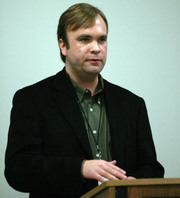Analysts are hired by media companies to explain Washington to the people "back home." They live in Washington, and in time nearly all "go native."
The most important pundits work for the dominant media. As I’ve noted before, each generation’s thesis also brings with it a new dominant medium. Under the Progressive Thesis, from 1896-1932, these were newspapermen like H.L. Mencken (right).
Under the FDR Thesis of Unity from 1932-68, many came to work in the electronic media, first on radio and later on TV. Conservatives complained loudly during this period that these people were "unelected," and "unreachable." Since they had "gone native" and expressed the dominant thesis of their time, most were liberal in outlook — the Republicans tended to express the Eisenhower AntiThesis. Movement conservatism was not heard.
Since 1968 we have developed a new set of media, TV and cable. And we have developed a new way to hire pundits. They are no longer taken from the ranks of working journalists. They are hired by think tanks, which are backed by corporations and multi-millionaires. After 40 years they are uniformly conservative. They either follow the Nixon Thesis of Conflict that has dominated our politics since 1968, or the Clinton AntiThesis, a "third way" that leans against that thesis and only seeks to moderate it, never to challenge it (because a challenge, they assume, would fail).
Bloggers are absolutely shocked, shocked at the "work" of these hacks. They are right to be angry. High Broderism (that’s David Broder above) has failed us utterly. It needs to be replaced, its practitioners retired.
But we also need to understand the times we are in. This is a period
of Crisis. The old Thesis has crumbled. Everyone knows this. The real
problems of the nation and the world are not being addressed. This was
true in 1967, it was true in 1931, it was true in 1895 and it was true
in 1859. It’s the brain-dead idiocy of the Pundits that is proof we are
entering a new era. (To the left, un-pundit Duncan Black of Atrios.)
These bloggers also need to understand that people are now turning to
them, to become the new elite, a meritocracy based on the quality of
their writing and the quality of their thought. The Internet is
intensely democratic. Unlike TV, even cable, you have the power here,
by what you read, what you link to, and what you recommend, to steer
the debate. That’s something of what Time Magazine was getting at when
they named you its Person of the Year, but it got lost in the muddle over YouTube postings and MySpace pages.
Instead of complaining, bloggers need to get back to work, and on the
whole most are doing that. And you need to get back to work — reading,
thinking, linking, recommending, writing. This is the biggest change of
the next Political Thesis, the Internet or Open Source Thesis I have
been talking about here for most of the last year.
Pundits don’t have to live in Washington. Pundits don’t have to work
for Big Media. Pundits are whoever you choose them to be. I can be one,
and so can you.














That’s something of what Time Magazine was getting at when they named you its Person of the Year, but it got lost in the muddle over YouTube postings and MySpace pages.
I think that was the point – they couldn’t very well ignore the Internet altogether, so they pretended it was about “everyone” rather than the very specific fact that the liberal blogosphere was being chosen over them as the place to find out what’s going on.
That’s something of what Time Magazine was getting at when they named you its Person of the Year, but it got lost in the muddle over YouTube postings and MySpace pages.
I think that was the point – they couldn’t very well ignore the Internet altogether, so they pretended it was about “everyone” rather than the very specific fact that the liberal blogosphere was being chosen over them as the place to find out what’s going on.